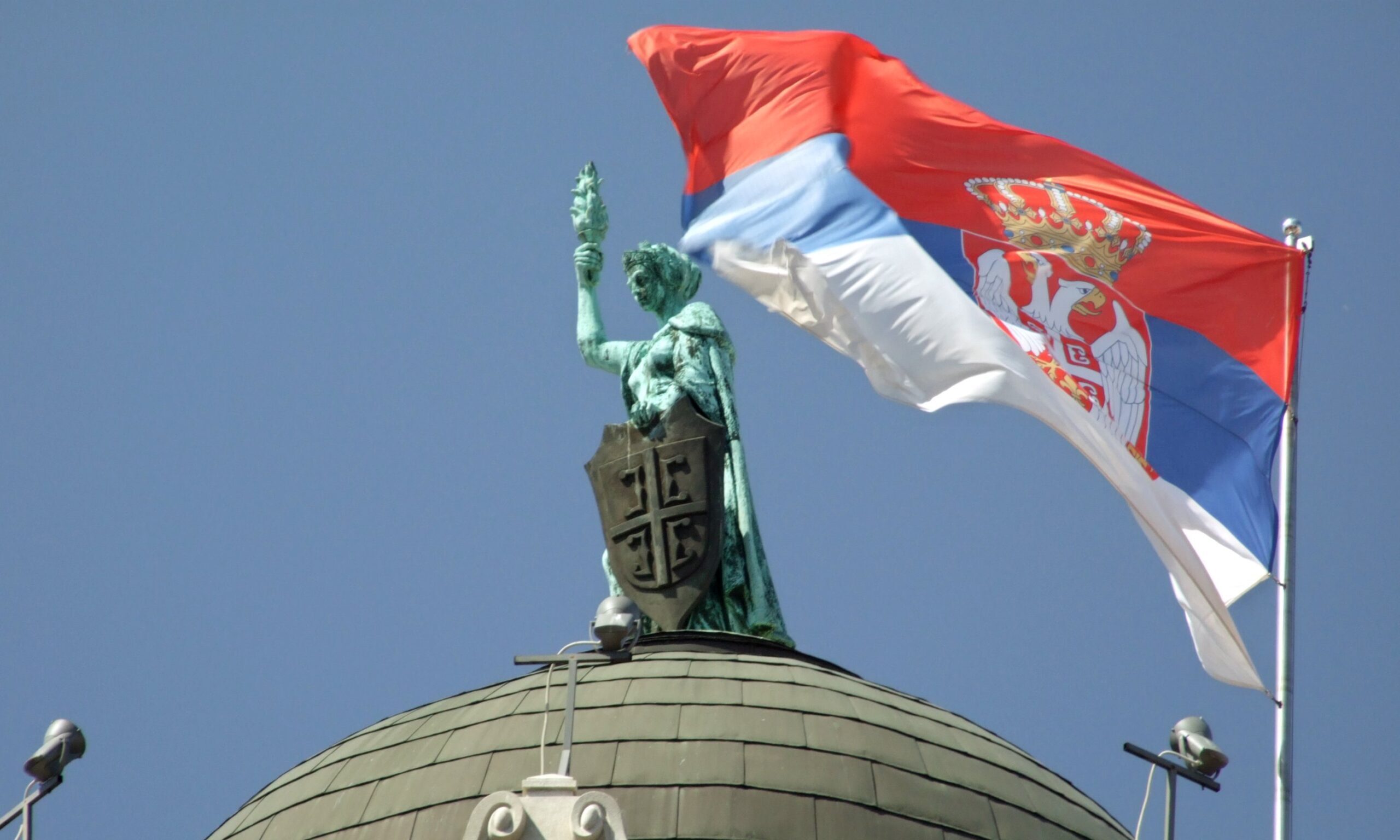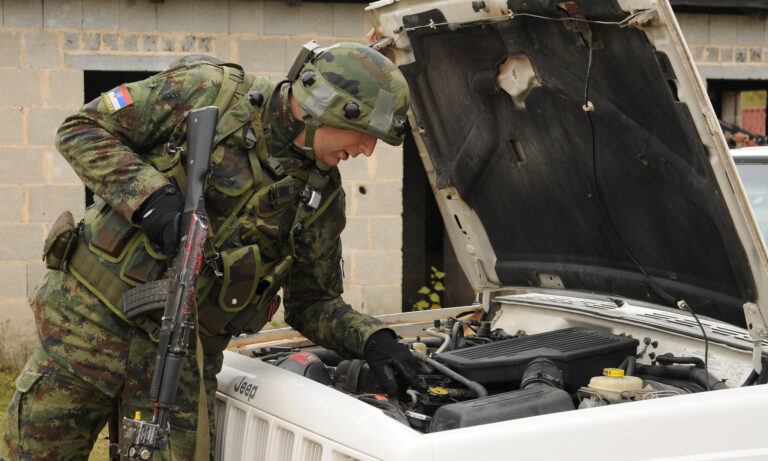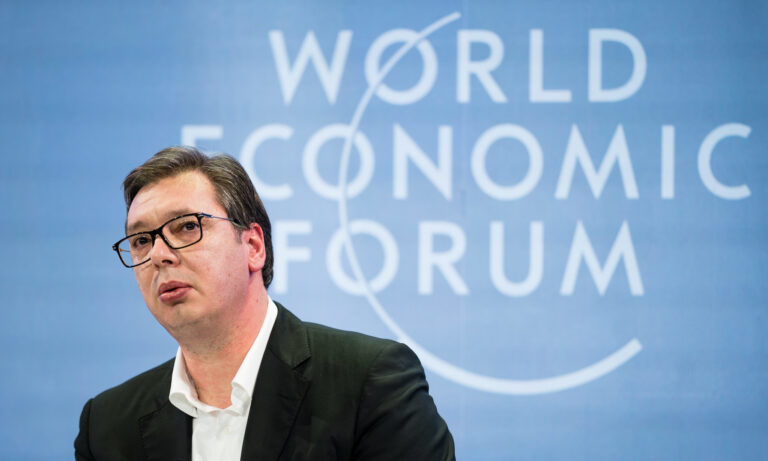Serbia’s Dance with the Dragon on the EU’s Doorstep

China’s expanding presence in the Western Balkans further complicates the region’s already tangled geopolitical landscape. For Serbia, as a lynchpin of China’s regional standing, the bilateral ties hold profound significance, even as they risk impeding the country’s pursuit of European integration. Facing, the challenge, the EU needs to make decisive steps to make Serbia finally decide whether it sees its future in or outside of the Union.
After years of stagnation, with the outbreak of Russian aggression in Ukraine, enlargement has become a prominent topic of interest for the EU once again. Seen as a process that would bring additional stability to the neighboring countries, heavily facilitated by the geopolitical developments, and deployed as a tool that would limit the impact of the foreign authoritarian actors in the EU neighborhood, enlargement has gained new momentum.
With the recent nod granted to Bosnia and Herzegovina in 2022 five of the six Western Balkan nations are on the edge of EU membership with the candidate country status. Kosovo, despite submitting its EU membership application in December 2022, still hovers in the uncertainty of potential candidacy.
As the Western Balkans leans towards European integration, the region emerges as a geopolitical hotspot, drawing the attention of various foreign actors seeking a strategic foothold. Among these, China, with its nuanced approach, has etched a notable presence in the region. Through bilateral relationships, the China-Central and Eastern European Countries (CEEC) cooperation platform (formerly known as the 16/17+1), and the strategic implementation of projects under the Belt and Road Initiative (BRI), Beijing has solidified its role across multiple nations in this corner of Europe.
China’s Nuanced Presence in the Region
In the complex landscape of Chinese engagement in the Western Balkans, divergent paths unfold as each nation forges its unique collaboration with Beijing. Memoranda of Understanding have been inked by five Western Balkan countries (all except Kosovo) and Beijing, cementing their commitment to the Belt and Road Initiative (BRI) and establishing them as key players in the China-Central and Eastern European Countries (CEEC) cooperation platform since its inception in 2012.
The idiosyncrasies of China’s involvement become apparent as we dissect the distinctive features characterizing the partnership with each Western Balkan nation. Beijing has fashioned a multifaceted strategy of economic engagement, with Chinese companies actively participating in projects spanning the energy, mining, and automotive sectors. The allure of the extractive and raw materials industry has captivated Chinese enterprises, fueled by demand dynamics emanating from both China and the Western Balkans. This intricate dance is not just about resource acquisition; it is a symbiotic relationship responding to China’s strategic need for specific raw materials and the Western Balkans’ quest for external support due to inherent limitations in independently developing these sectors.
The imperative of partnerships with Chinese companies or international entities boasting substantial levels of Chinese ownership has become paramount for Western Balkan countries. This interdependence reflects the intricacies of a region grappling with developmental challenges, where collaboration with China is not merely a choice but a strategic necessity.
Navigating the challenges inherent in Chinese involvement in the Western Balkans reveals Beijing’s attempts to broaden its influence in the Western Balkans region that resonates with larger trends observed in the wider Central and Eastern European (CEE) context. This panorama is characterized in many countries by a discernible absence of concrete outcomes, a trend that, with the exception of Serbia, manifests in relatively modest Chinese Foreign Direct Investment (FDI). The statement by Prime Minister of Albania, Edi Rama, that Albania gained ‘’zero benefit from cooperation with China’’ but will continue to nurture established communication describes the situation appropriately. As countries in the region, initially enthusiastic about bilateral agreements with China, exercise increasing caution, Beijing’s allure nevertheless persists, steadily enhancing its sway and presence in select quarters.
Crucially, China’s involvement in the Western Balkans is intricately linked to demand-driven dynamics. In the aftermath of the global financial crisis, the region, grappling with developmental disparities, sought avenues for accessible infrastructure development. In response, the Chinese government, backed by banks and companies, extended a helping hand. The allure of Chinese-supported projects lies in their low or non-existent conditionality, in contrast to the financial schemes provided by Western institutions. This economic and financial flexibility positions Beijing as a preferred partner, especially in the context of the fragile state of democratic development and weak democratic norms prevalent in specific Western Balkans countries. This intricate dance is further amplified by a domestic concentration of power, facilitating engagements with China that align with the official narrative of the Chinese Communist Party (CCP). It dovetails with a fundamental objective of the Belt and Road Initiative, portraying China as a benevolent provider of economic development, committed to cooperation devoid of imposing conditions, with the singular goal of offering essential assistance.
China’s Influence in Serbia: A Torchbearer in the Western Balkans
In the complex geopolitical chessboard of the Western Balkans, Belgrade emerges as the torchbearer of Chinese influence. The involvement of Chinese-backed entities, their strategic choice of sectors, endorsement from local leadership, and the cumulative impact of projects make Serbia the pinnacle of Chinese presence in the region.
The dynamic nature of China’s involvement in Serbia is palpable, transcending the boundaries of economic ties, and extending to political and geopolitical alignment. This was most recently evidenced by President Aleksandar Vučić’s trip to China in October 2023 for the Third Belt and Road Summit. The signing of 18 agreements, including the pivotal Free Trade Agreement (FTA), stirred concerns, particularly in the context of Serbia’s EU candidacy and the imperative to align trade policies with the bloc.
Through active efforts of the Serbian establishment, the narrative of China as a transformative force in Serbia’s economic development takes center stage, championed not only by President Vučić and his political cohort but also amplified by the pro-governmental media. The influx of FDI from China into Serbia stands as a testament to the depth of this bilateral engagement, surpassing €4.1 billion between 2014 and 2022. This financial infusion, particularly pronounced in 2021 and 2022, solidifies China’s role as a pivotal contributor to the country’s economic development, eclipsing other nations in its impact.
China’s engagement slices through diverse sectors, notably leaving an indelible mark in mining, metal manufacturing and the automotive industry, which are also outlined as key sectors for Chinese investment by the Chinese Ministry of Commerce. Metal manufacturing and mining attracted both brownfield and greenfield investments, including acquisitions like the Smederevo Steel Mill and Bor mines, as well as the Čukaru Peki project. The automotive sector mainly saw greenfield investments, with notable projects like the Linglong vehicle tire factory and Minth Automotive Europe‘s €100 million investment in Loznica. Central Serbia also attracted Chinese capital, with Mei Ta Europe investing €150 million in the Obrenovac Municipality, and Yanfeng initiating a €40 million greenfield investment in Kragujevac. Despite recognition as Chinese investments, it is worth noting that Mei Ta Europe’s parent company has ties to Taiwan, which Serbia does not officially recognize. Xingyu Automotive Systems, announced in 2020 with an estimated value of €50-€60 million, has faced challenges in progressing beyond trial production, prompting financial support from the Serbian government for full-scale production.
Chinese investments allow the Serbian government to present China not just as a stakeholder but as a driving force behind Serbia’s economic growth, as stated by Serbian Prime Minister, Ana Brnabić, during the official bilateral visit to China in November of 2023. The allure of Chinese capital resonates beyond mere monetary figures, permeating the narrative of Serbia’s economic trajectory and solidifying the image of Beijing as a key Serbian partner on the global stage.
Beyond Economic Cooperation
The Sino-Serbian partnership extends far beyond economic cooperation, reaching into the realm of political engagement. The Serbian Progressive Party’s close ties with the CCP form a robust bridge between Belgrade and Beijing. This alignment, particularly on issues of territorial integrity, has the two sides offering mutual support and taking a firm stance on the importance and principle of territorial integrity within the framework of international law. In October of 2023, Xi Jinping reiterated the stance that ‘’Serbia was an ‘ironclad friend’ of China’’ and that ‘’China firmly supported Serbia in safeguarding national sovereignty and territorial integrity and stood ready to continue to strengthen strategic synergy with Serbia in order to translate the traditional friendship between the two countries into more fruits of practical cooperation.’’
However, as with any diplomatic entanglement, challenges have surfaced, casting shadows on the seemingly seamless partnership. Environmental concerns in Smederevo and anxieties surrounding land and water pollution in Bor have emerged as prickly points of contention. In Smederevo, local activist organization Tvrđava (The Fort) filed a criminal lawsuit against Chinese company HBIS, claiming that the pollution from the steel mill production process contributes to 220 deaths annually. Similar claims have also been pointed out in Bor, with the Serbian courts fining Zijin for the level of pollution as well as for starting the construction of the new smelting capacities without proper permits.
China’s Impact on the European Integration Process
Recently, the ramifications of China’s expanding influence in Serbia have become increasingly apparent, casting a shadow over the country’s progress toward European integration. This unsettling trend aligns closely with the argument that Serbian actors are driving demand-driven cooperation. While Chinese entities are contributing to the lack of transparency in infrastructural agreements and exerting environmental pressures in their operational areas, it is crucial to acknowledge the active role played by domestic actors in this complex dynamic.
Serbian stakeholders, in their pursuit of economic opportunities and development, have become integral players in facilitating this mode of cooperation. The impact of cooperation with China on the rule of law in Serbia is embodied in the readiness to use bilateral international agreements to bypass the need for transparent processes in choosing infrastructural development partners. While these joint projects are in line with the Serbian normative framework, as they are signed under the Framework Agreement on Economic and Technological Infrastructure Cooperation, there are questions about choosing China before Western financial institutions in the first place.
Another concern that has arisen has been intertwined with the question of economic and fiscal stability of Serbia as a candidate country for the EU membership. However, in this regard, the fears seem to be exaggerated. So far, the deals with China do not seem to put Serbia at risk of being overly exposed to debt risk. Public Debt Administration Office of Serbia data shows that the current level of Serbian debt based on contracts signed with Exim Bank is $2.76 billion, which is 10.58 percent of the total foreign debt of the country. According to the same data, the public debt to GDP ratio in Serbia is 51.5 percent, which makes the Serbian position relatively comfortable.
Amid broader systemic challenges, Serbia’s increasingly close ties with China are raising specific concerns in the context of its pursuit of EU membership. The recent signing of a Free Trade Agreement between Serbia and China is directly at odds with the harmonization of European policies, adding complexity to Serbia’s path towards EU integration. As a candidate country, Serbia is expected to align its foreign trade and economic policies with those of the EU. In this respect, the deal encompassing 10,412 articles exported from Serbia and 8,930 import articles presents a particular challenge.
First, as a candidate country for EU membership, Serbia is expected to align its foreign trade policy with that of the EU. The decision to forge an FTA with China, especially considering the absence of such an agreement between the EU and China, diverges from the official EU policy. Consequently, Serbia would need to rescind the agreement before joining the bloc.
Second, the extended timeline for full implementation of the agreement is worrisome. With a projected period of up to 15 years for the complete reduction of certain tariffs, it implies that the Serbian leadership may not envision EU membership for the next 15 years or has willingly entered into an agreement that may not be fully realized.
Last, a notable aspect of the agreement is its emphasis on weaponry. Serbia stands to gain incremental discounts annually on the purchase of Chinese missiles, bombs, torpedoes, tanks, and other defense-related products listed in the agreement. Customs tariffs for these Chinese-manufactured weapons are set to decrease from 25 percent to 2.5 percent over the 15-year period. The strategic implications of a country on the EU border with the potential to freely acquire and sell weaponry with China raise significant concerns about the overall security outlook of the nation.
(Non)Aligning with the EU’s Foreign Policies
This divergence is emblematic of a broader issue – Serbia’s notable misalignment with the EU’s Common Foreign and Security Policy (CFSP). Among Western Balkan countries, Serbia consistently exhibits the lowest alignment with CFSP declarations, a trend influenced by its close associations with non-EU actors such as Russia, China, and Iran.
Data from 2020 onwards underscores Serbia’s failure to fully adopt CFSP measures, particularly concerning Russia, China, and human rights violations. The country’s reluctance to align on China policy extends to critical issues to the Union, such as Hong Kong, cyber threats, and human rights abuses, notably in Xinjiang.
Experts attribute this non-alignment to Serbia’s pursuit of national interests, especially in the context of Kosovo’s independence, and economic considerations driven by its deepening ties with China. However, this strategic approach is increasingly untenable, placing Serbia in a dilemma – whether to fully commit to its European trajectory or maintain special relationships with China and Russia.
Critics argue that Serbia’s current stance may pose challenges as it engages in the EU’s decision-making process. While candidate countries are not obligated to fully align with EU foreign policy, a reassessment of their outlook is considered crucial for successful EU membership, which is also noted in the EU Commission Country Report for 2023. Serbia’s dedication to the EU’s values is essential for constructive participation, and failure to align may risk disruptive roles within the EU community.
The future trajectory of Serbia’s European integration process relies heavily on the choices made by these stakeholders. While China presents opportunities for economic growth and infrastructural development, it is ultimately up to the Serbian actors to decide whether to align themselves with European values and standards. The delicate balance between seizing economic opportunities and staying on course for European integration requires a steadfast commitment from Belgrade.
EU’s Role in Mitigating the Chinese Impact
Authoritarian tendencies in Serbia, coupled with the lack of conditionality in areas like the rule of law and environmental standards, have made actors like China more appealing to decision-makers. However, the EU’s strategy faces limitations, as evidenced by the stagnation of the enlargement process. The evolving geopolitical landscape, especially after Russia’s invasion of Ukraine, introduces the potential for a shift in the paradigm. If the EU prioritizes enlargement for geostrategic reasons and downplays the imperative of completed reforms in the whole Western Balkans, it could alter the trajectory of the enlargement process.
The EU’s enlargement policy remains a crucial tool for addressing matters in the Western Balkans, fostering resilient institutions to navigate challenges posed by increased cooperation with China. Still, the enlargement process is just a framework for creating a well-functioning governance system based on democratic values and the rule of law. Becoming an EU member does not guarantee the preservation and development of democracy in a country. So the task for the EU is not only to use enlargement to mitigate foreign influences, but to assist in building of democratic societies throughout candidate countries.
The region remains at a crossroads of foreign influences with an evident trend of democratic backsliding and the rise of authoritarian tendencies in several countries. Without the direct involvement and dedication shown by the EU and other Western partners, there is a strong chance that the region will become even more open to the rise of influences that could be described as malign, and actors who operate with the goal of increasing instability in the Western Balkans.
To mitigate the increasing Chinese impact on Serbia’s European integration process, the EU has to take strategic measures to safeguard its interests and values. One crucial step is for Serbia to recognize the importance of conditionality coming with the European integration process. By emphasizing the significance of democratic norms, the rule of law, and environmental standards in dealings with Western Balkan countries, especially Serbia, the EU can establish a more compelling alternative to Chinese engagements that may lack such stringent conditions. Making adherence to these principles a prerequisite for further integration can shape a more robust and sustainable partnership.
Additionally, the EU should strategically allocate economic support to Serbia and the Western Balkans. Targeting sectors crucial for sustainable development with grants and incentives can not only bolster economic growth but also address some of the developmental challenges that make the region susceptible to alternative partnerships.
Recognizing the need to fortify its role in the region in response to perceived economic challenges posed by external actors like China, the EU has implemented tangible policy actions, such as the introduction of the Economic and Investment Plan (EIP) for the Western Balkans. The EIP outlines 10 flagship projects, totaling €9 billion in grants, focusing on green energy and infrastructure initiatives. This strategic move aims not only to safeguard the EU’s economic interests but also to consolidate its geopolitical standing amid evolving regional and global dynamics.
To address concerns about transparency in agreements with Chinese entities, the EU can play a pivotal role in advocating for and facilitating transparent investment practices. Establishing clear guidelines and ensuring adherence to international standards in financial transactions can mitigate suspicions and build trust in EU collaborations.
On the other hand, for Serbia to demonstrate a stronger commitment to European integration, certain measures need to be prioritized. Accelerating ongoing reforms related to the rule of law, democratic governance, and environmental standards is paramount. Tangible progress in these areas will not only strengthen Serbia’s case for EU membership but also address concerns raised by the EU regarding the lack of conditionality in its partnerships.
Addressing environmental concerns in specific regions, such as Smederevo and Bor, is crucial for Serbia’s alignment with European standards. Implementing stringent environmental policies and investing in sustainable practices can alleviate tensions with the EU and contribute to long-term environmental well-being.
Furthermore, enhancing transparency is key. Serbia should proactively address transparency issues in its agreements with Chinese entities, providing clear and accessible information about collaborations, including financial transactions and project details. This proactive approach will enhance transparency and build trust with the EU.
Lastly, aligning foreign policy more closely with EU positions on sensitive global issues, such as Hong Kong and Xinjiang, will strengthen Serbia’s standing in the eyes of the EU. Demonstrating a shared commitment to common values and principles will facilitate smoother integration and underscore Serbia’s dedication to its European path.
Written by
Stefan Vladisavljev
vladisavljev_sStefan Vladisavljev is CHOICE Visiting Fellow. He is also the Program Coordinator of the Serbia-based non-governmental organization Foundation BFPE for a Responsible Society. He analyzes Chinese presence in Central and Eastern Europe with a special focus on Serbia and the Western Balkans.


